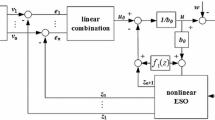Abstract
The design of an adaptive controller and stability analysis of the corresponding closed loop system are discussed for a class of SISO systems based on the characteristic model method. The obtained characteristic model is a second-order slow time-varying linear system with a compress mapping function for the system modeling error. The pole placement method is used to design the controller, and sufficient conditions for the stability of the closed loop system are obtained based on the robust control theory of slow time-varying systems with perturbations. The effectiveness of the proposed method is illustrated by two numerical examples.
摘要
创新点
本文针对一类仿射非线性连续SISO系统, 通过压缩映射思想构建一个简洁二阶的慢时变差分方程作为其对应原连续系统的特征模型。 同时, 充分考虑特征建模过程中离散截断误差和未建模误差对系统稳定性的影响, 给出了在上述误差满足稳定收敛的条件下基于特征模型的自适应控制设计能够保证原系统镇定的充分条件。 从而将针对原系统的复杂控制设计问题转化成特征模型基础上的极点配置自适应控制问题, 该方法具有较强的工程实现意义。 最后通过仿真给出了不同极点配置方法的性能比较, 验证了所提方法的有效性。
Similar content being viewed by others
References
Wu H X, Hu J, Xie Y C. Characteristic model-based intelligent adaptive control. Beijing: China Science and Technology Press, 2009
Wu H X, Hu J, Xie Y C. Characteristic model-based adaptive control method and applications. IEEE Trans Syst Man Cybern Part C-Appl Rev, 2007, 37: 213–221
Wang Y. Stability analysis of characteristic model based all-coefficient adaptive control for a class of minimum-phase linear system. Proc Eng, 2012, 29: 2410–2420
Gao S G, Dong H R, Ning B. Characteristic model-based all-coefficient adaptive control for automatic train control systems. Sci China Inf Sci, 2014, 57: 092201
Xie Y C, Hu J. The application of the intelligent adaptive control method based on characteristic model in rendezvous and docking. J Syst Sci Complexity, 2013, 33: 1017–1023
Zhang Z, Hu J. Stability analysis of a hypersonic vehicle controlled by the characteristic model based adaptive controller. Sci China Inf Sci, 2012, 55: 2243–2256
Gong Y L, Wu H X. Characteristic model-based adaptive attitude control for hypersonic vehicle. J Astronaut, 2009, 31: 2122–2128
Wang L J. Characteristic model-based attitude controller and adaptive filter design for the hypersonic vehicle. Aerosp Control Appl, 2011, 37: 14–20
Yu H X, Lei Y J. Characteristic-model-based attitude control for satellites with input saturation. Aerosp Control Appl, 2013, 39: 44–53
Luo X, Li J. Fuzzy dynamic characteristic model based attitude control of hypersonic vehicle in gliding phase. Sci China Inf Sci, 2011, 54: 448–459
Yang J C, Hu J, Ni M L. Adaptive guidance law design based on characteristic model for reentry vehicles. Sci China Ser-F: Inf Sci, 2008, 51: 2005–2021
Meng B, Wu H X. Proof of characteristic model of linear system. Sci China Ser-E: Tech Sci, 2007, 37: 1258–1277
Sun D Q, Wu H X. Characteristic model and control method of MIMO high-order linear systems. Aerosp Control, 2004, 22: 4–10
Meng B, Wu H X. On characteristic modeling of a class of flight vehicles’ attitude dynamics. Sci China Tech Sci, 2010, 53: 2074–2080
Wang Y. Stability analysis of characteristic model-based adaptive method for a class of minimum-phase nonlinear system. Control Theory Appl, 2012, 29: 1097–1107
Li H, Sun Z Q, Min H B, et al. Fuzzy dynamic characteristic modeling and adaptive control of nonlinear systems and its application to hypersonic vehicles. Sci China Inf Sci, 2011, 54: 460–468
Li C Y, Guo L. A dynamical inequality for the output of uncertain nonlinear systems. Sci China Inf Sci, 2013, 56: 112–120
Nešić D, Teel A R. A framework for stabilization of nonlinear sampled-data systems based on their approximate discrete-time models. IEEE Trans Automat Control, 2004, 49: 1103–1122
Wang Y. Analysis for some stability properties of all-coefficient adaptive controller. Aerosp Control Appl, 2012, 38: 10–16
Xie Y C, Wu H X. The robustness of the all-coefficient adaptive control method. Acta Automat Sin, 1997, 23: 151–159
Meng B, Wu H X. Convergence and stability of the golden-section control. J Astronaut, 2009, 30: 2128–2132
Chen L, Shen S P. Stability analysis of golden section adaptive control system based on multivariable characteristic model. Tech Automat Appl, 2013, 32: 11–15
Qi C Z, Wu H X, Lu Z D. Study on the stability of multivariable all-coefficient adaptive control system. Control Theory Appl, 2000, 17: 489–494
Yan Z, Wang J. Robust model predictive control of nonlinear systems with unmodeled dynamics and bounded uncertainties based on neural networks. IEEE Trans Neural Netw Learn Syst, 2014, 25: 457–469
Aswani A, Gonzalez H, Sastry S S, et al. Provably safe and robust learning-based model predictive control. Automatica, 2013, 49: 1216–1226
Wang Z M. Sampled-data stabilization controller design of continuous-time nonlinear control systems: an approach based on their approximate discrete-time models (in Chinese). Dissertation for the Doctoral Degree. ShangHai: East China Normal University, 2003
Nešić D, Teel A R. Stabilization of sampled-data nonlinear systems via backstepping on their Euler approximate model. Automatica, 2006, 42: 1801–1808
Fidan B, Zhang Y, Ioannou P. Adaptive control of a class of slowly time varying systems with unmodeling uncertainties. IEEE Trans Automat Control, 2005, 50: 915–920
Wang Y Z, Feng G. On finite-time stability and stabilization of nonlinear port-controlled Hamiltonian systems. Sci China Inf Sci, 2013, 56: 108202
Kreisselmeier G. Adaptive control of a class of slowly time varying plant. Syst Control Lett, 1986, 8: 97–103
Author information
Authors and Affiliations
Corresponding author
Rights and permissions
About this article
Cite this article
Huang, J., Kang, Y., Meng, B. et al. Characteristic model based adaptive controller design and analysis for a class of SISO systems. Sci. China Inf. Sci. 59, 052202 (2016). https://doi.org/10.1007/s11432-015-5310-1
Received:
Accepted:
Published:
DOI: https://doi.org/10.1007/s11432-015-5310-1



